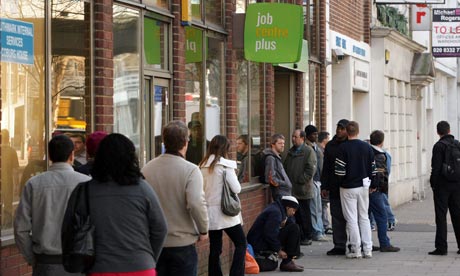An MP's proposal to stop claimants buying 'luxury goods' would fit with a new website that tracks job search activities
Wail Qasim

'Under the jobseeker model of unemployment benefit the assumption is that the search for work is the claimant's daily job.' Photograph: Oli Scarff/Getty Images
Money acts as the sole means of access to much of society. What does it mean then for its use to be regulated among the poorest? Conservative MP Alec Shelbrooke introduced this idea in the form of a "welfare cash card" in the House of Commons on Tuesday. The card would prevent the purchase of "luxury items" such as cigarettes and alcohol by those on benefts. Shelbrooke justified it by invoking the memory of William Beveridge and the "five giant evils". The card, as with much recent welfare policy, does share an underpinning principle with Beveridge's report: the disciplining of the out-of-work poor. Iain Duncan Smith, the work and pensions secretary, is said to have dismissed the idea, but Shelbrooke's proposal is a telling indication of Tory thinking on labour policy.
Since the financial crash of 2008 and the subsequent austerity measures, many more of us find ourselves underemployed or out of work entirely. Unemployment in October 2008 was at 1.87m – in October 2012 the figure had risen to 2.51m, even after the Olympics labour boom. The government's policy response to this has been to impose increasingly difficult conditions on claimants while seemingly waiting for a miracle to provide jobs.
The "welfare cash card" idea is yet another iteration of this. The proposal is for benefits to be paid to a chip and pin card that would bar the purchase of basic amenities misleadingly described as luxuries. For a long time the government has worked hard to inculcate an image of benefits claimants as "financially reckless" to justify its disciplinarian measures, an image Shelbrooke happily uses to advocate for financial monitoring. The impetus behind this seems only to be the punishment of claimants through privation whilst many are already turning to loans and other means to supplement ever-squeezed benefit payments. In this light it is hard to take seriously the MP's cynical appeal to "raise children out of poverty".
The state of welfare policy is no different, however. Workfare, for example, extends the logic of maintaining a standing army of the unemployed, drilled in the practice of work but not paid for it, which already existed in germ form in jobseeker's allowance. Under the jobseeker model of unemployment benefit the assumption is that the search for work is the claimant's daily job. The ritual of attending the jobcentre to prove that you have made adequate attempts to find work can be gruelling, not least when in many areas there simply aren't enough jobs advertised to satisfactorily complete your job search form.
The entire lives of those who seek state help to live come to revolve around ensuring that the minimal benefits they receive actually do arrive in their account. This is why writers such as André Gorz have been describing jobseeker's allowance as "workfare" since 2003. Discipline comes to dominate our lives whether we are employed or not and whether it is from employer or state.
The introduction of the universal credit system, where a range of benefits will be rolled into a single payment, will see conditionality and the disciplinary role of benefits further intensified. As Shelbrooke's system stands it would seem likely to apply to all those receiving the universal credit, monitoring and limiting the spending of workers and the unemployed alike. This process will be mirrored in the implementation of the universal jobmatch website as a method to spy on claimants' job search activities. The new website will scan benefit claimants' CVs and automatically match them with job opportunities, but it will also allow authorities to remotely track claimants' search activities.
With this in mind the entire myth of tackling "intergenerational worklessness" has to be brought into question. Recent Joseph Rowntree foundation research has put paid to the cliche of "families with three generations unemployed", yet Shelbrooke's discussion of the "welfare cash card" rests on this mythic figure. Even if these families existed it would be unwise to treat their situations as an issue of personal spending choices and not a consequence of how our economy is run.